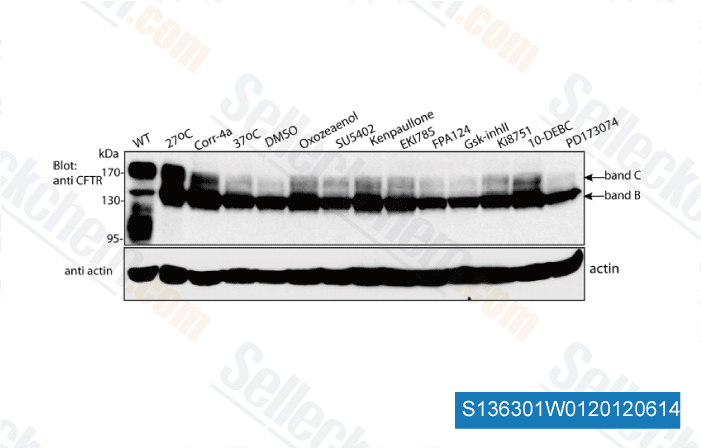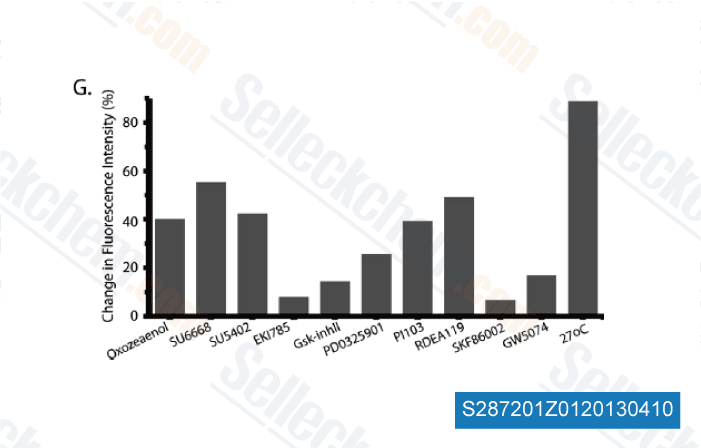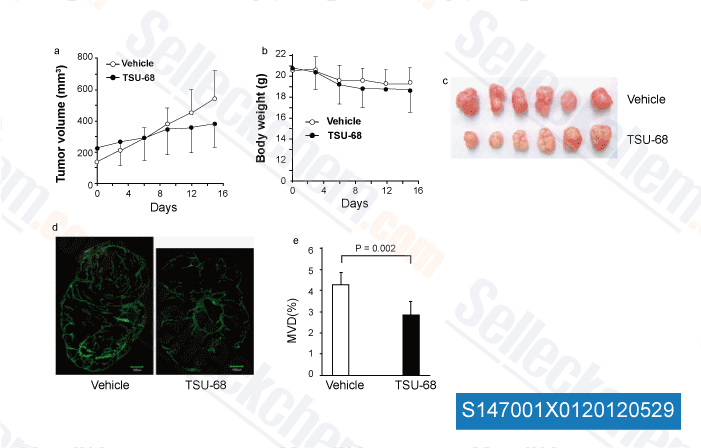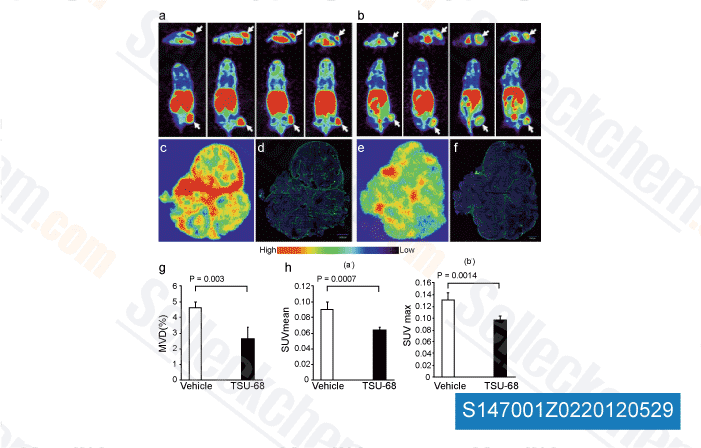|
Toll Free: (877) 796-6397 -- USA and Canada only -- |
Fax: +1-832-582-8590 Orders: +1-832-582-8158 |
Tech Support: +1-832-582-8158 Ext:3 Please provide your Order Number in the email. |
Technical Data
| Formula | C18H18N2O3 |
||||||
| Molecular Weight | 310.35 | CAS No. | 252916-29-3 | ||||
| Solubility (25°C)* | In vitro | DMSO | 62 mg/mL (199.77 mM) | ||||
| Water | Insoluble | ||||||
| Ethanol | Insoluble | ||||||
| In vivo (Add solvents to the product individually and in order) |
|
||||||
|
* <1 mg/ml means slightly soluble or insoluble. * Please note that Selleck tests the solubility of all compounds in-house, and the actual solubility may differ slightly from published values. This is normal and is due to slight batch-to-batch variations. * Room temperature shipping (Stability testing shows this product can be shipped without any cooling measures.) |
|||||||
Preparing Stock Solutions
Biological Activity
| Description | Orantinib (TSU-68, SU6668) has greatest potency against PDGFR autophosphorylation with Ki of 8 nM in a cell-free assay, but also strongly inhibits Flk-1 and FGFR1 trans-phosphorylation, little activity against IGF-1R, Met, Src, Lck, Zap70, Abl and CDK2; does not inhibit EGFR. Phase 3. | ||
|---|---|---|---|
| Targets |
|
||
| In vitro | TSU-68 is a competitive inhibitor, with regard to ATP, to Flk-1/KDR trans-phosphorylation, FGFR1 trans-phosphorylation, and PDGFRβ kinases autophosphorylation. TSU-68 (0.03-10 μM) inhibits tyrosine phosphorylation of KDR in VEGF stimulated HUVECs. TSU-68 also inhibits PDGF-stimulated PDGFRβ tyrosine phosphorylation in NIH-3T3 cells overexpressing PDGFRβ at a minimum concentration of 0.03-0.1 μM. TSU-68 inhibits acidic FGF-induced phosphorylation of the FGFR1 substrate 2 at 10 μM and higher. However, TSU-68 (up to 100 μM) has no effect on EGF-stimulated EGFR tyrosine phosphorylation in NIH-3T3 cells overexpressing EGFR. TSU-68 inhibits VEGF-driven and FGF-driven mitogenesis of HUVECs with mean IC50 of 0.34 μM and 9.6 μM, respectively. [1] In human myeloid leukemia MO7E cells, TSU-68 inhibits the tyrosine autophosphorylation of stem cell factor (SCF) receptor, c-kit, with IC50 of 0.1-1 μM, as well as ERK1/2 phosphorylation, a signaling event downstream of c-kit activation. TSU-68 also inhibits SCF-induced proliferation of MO7E cells with IC50 of 0.29 μM, and induces apoptosis. [2] | ||
| In vivo | TSU-68 (75-200 mg/kg) induces tumor growth inhibition against a broad range of tumor types in xenograft models in athymic mice, including A375, Colo205, H460, Calu-6, C6, SF763T, and SKOV3TP5 cells. TSU-68 (75 mg/kg) also suppresses tumor angiogenesis of C6 glioma xenografts. [1] In a tumor model of HT29 human colon carcinoma, TSU-68 (200 mg/kg) decreases the average vessel permeability and average fractional plasma volume in the tumor rim and core. TSU-68 promotes abnormal stromal development at the periphery of carcinomas. [3] In a rabbit VX2 liver tumor model, TSU-68 (200 mg/kg) augments the effect of chemotherapeutic infusion. [4] |
Protocol (from reference)
| Kinase Assay: |
|
|---|---|
| Cell Assay: |
|
| Animal Study: |
|
References
Customer Product Validation

-
Data from [Mol Cell Proteomics, 2012]

-
Data from [Mol Cell Proteomics, 2012]

-
Data from [Angiogenesis, 2012, 15, 569-80]

-
Data from [Angiogenesis, 2012, 15, 569-80]
Selleck's Orantinib (SU6668) has been cited by 23 publications
| SMYD5 is a novel epigenetic gatekeeper of the mild hypothermia response [ bioRxiv, 2023, 2023.05.11.540170] | PubMed: 37333301 |
| SMYD5 is a novel epigenetic gatekeeper of the mild hypothermia response [ bioRxiv, 2023, 2023.05.11.540170] | PubMed: 37333301 |
| Establishment and Characterization of NCC-PMP1-C1: A Novel Patient-Derived Cell Line of Metastatic Pseudomyxoma Peritonei [ J Pers Med, 2022, 12(2)258] | PubMed: 35207746 |
| Establishment and characterization of NCC-UPS4-C1: a novel cell line of undifferentiated pleomorphic sarcoma from a patient with Li-Fraumeni syndrome [ Hum Cell, 2022, 10.1007/s13577-022-00671-y] | PubMed: 35118583 |
| Establishment and characterization of NCC-MFS4-C1: a novel patient-derived cell line of myxofibrosarcoma [ Hum Cell, 2021, 34(6):1911-1918] | PubMed: 34383271 |
| Establishment and characterization of the NCC-GCTB4-C1 cell line: a novel patient-derived cell line from giant cell tumor of bone [ Hum Cell, 2021, 10.1007/s13577-021-00639-4] | PubMed: 34731453 |
| Establishment and characterization of novel patient-derived cell lines from giant cell tumor of bone [ Hum Cell, 2021, 10.1007/s13577-021-00579-z] | PubMed: 34304386 |
| The Meningioma Enhancer Landscape Delineates Novel Subgroups and Drives Druggable Dependencies [ Cancer Discov, 2020, CD-20-0160] | PubMed: 32703768 |
| Establishment and characterization of NCC-MFS2-C1: a novel patient-derived cancer cell line of myxofibrosarcoma [ Hum Cell, 2020, 10.1007/s13577-020-00420-z] | PubMed: 32870449 |
| Multi-omic Profiling Reveals Dynamics of the Phased Progression of Pluripotency. [ Cell Syst, 2019, 8(5):427-445] | PubMed: 31078527 |
RETURN POLICY
Selleck Chemical’s Unconditional Return Policy ensures a smooth online shopping experience for our customers. If you are in any way unsatisfied with your purchase, you may return any item(s) within 7 days of receiving it. In the event of product quality issues, either protocol related or product related problems, you may return any item(s) within 365 days from the original purchase date. Please follow the instructions below when returning products.
SHIPPING AND STORAGE
Selleck products are transported at room temperature. If you receive the product at room temperature, please rest assured, the Selleck Quality Inspection Department has conducted experiments to verify that the normal temperature placement of one month will not affect the biological activity of powder products. After collecting, please store the product according to the requirements described in the datasheet. Most Selleck products are stable under the recommended conditions.
NOT FOR HUMAN, VETERINARY DIAGNOSTIC OR THERAPEUTIC USE.
